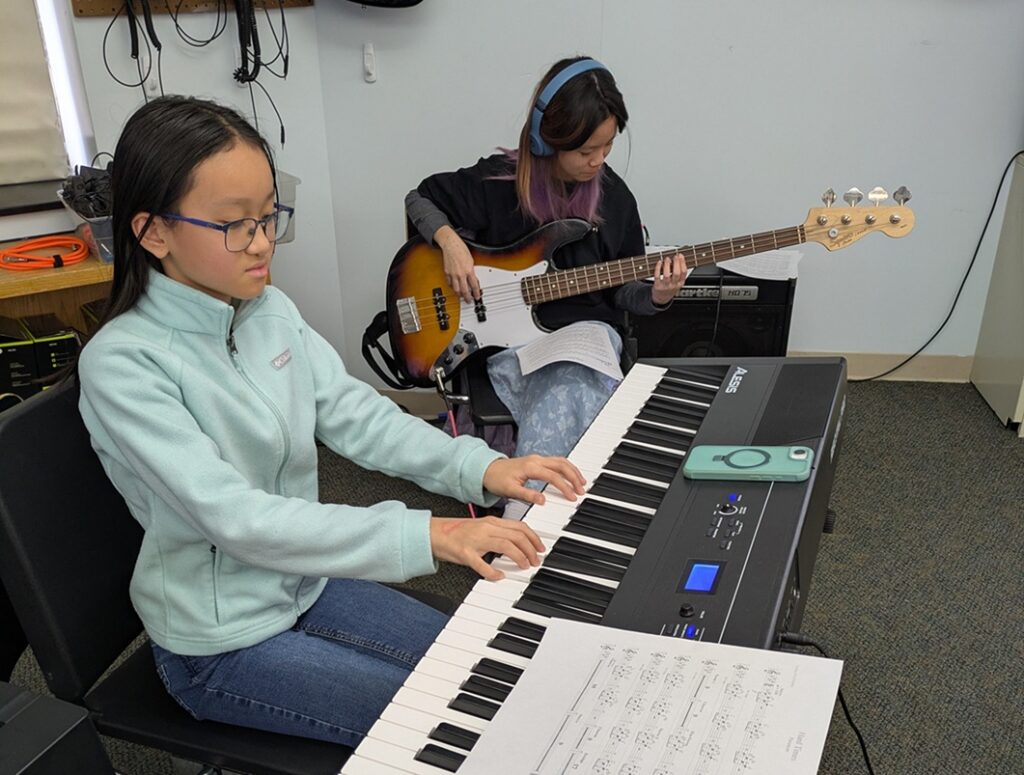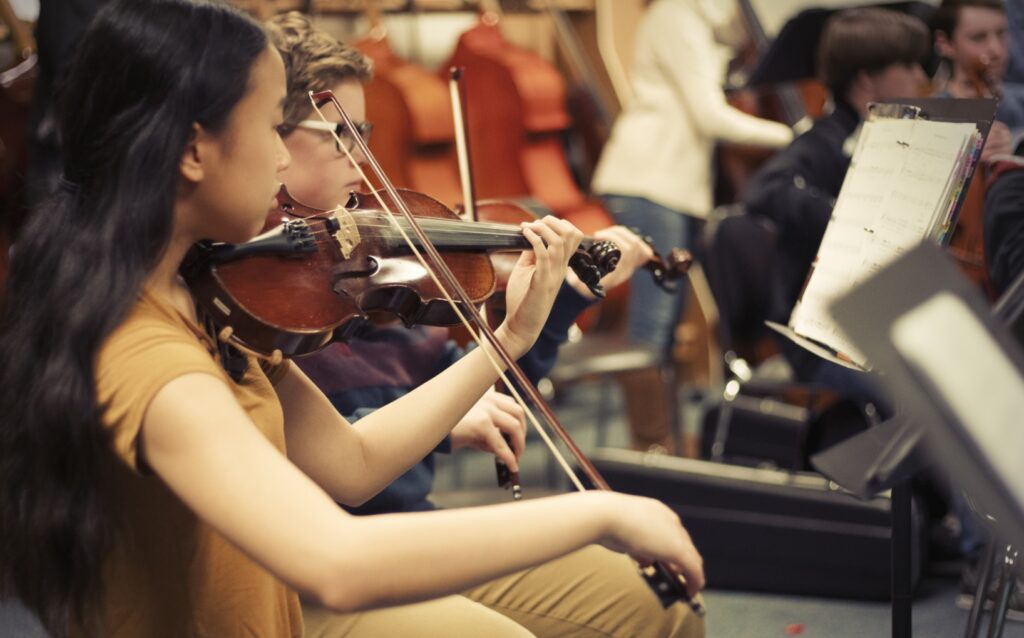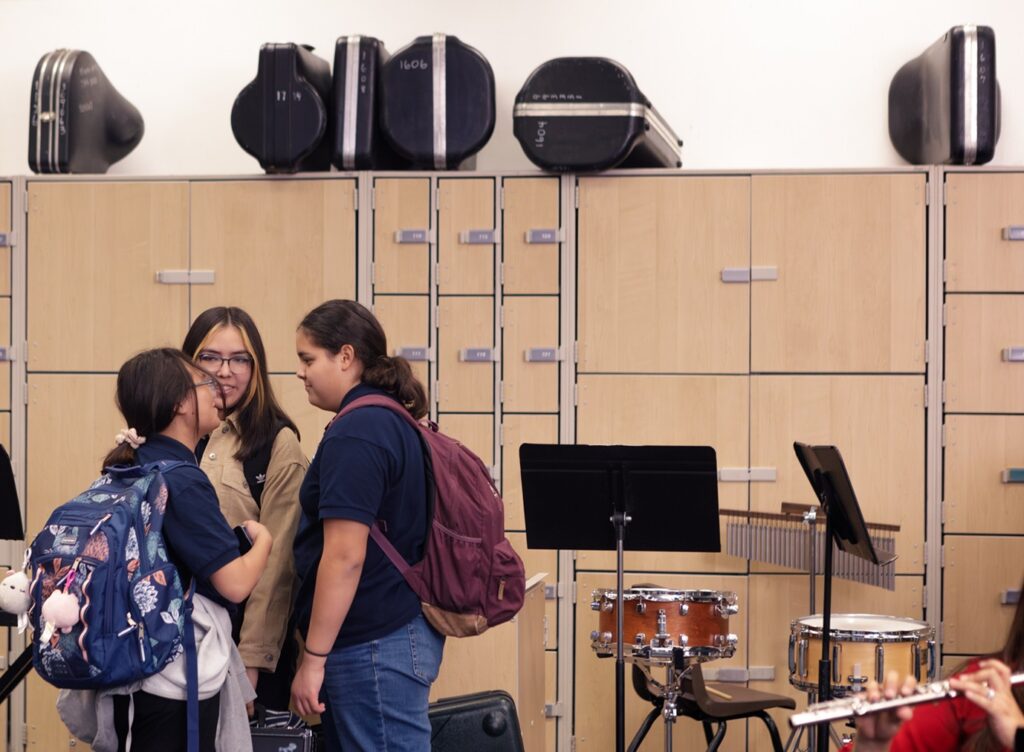Tagged Under:
Thinking About Grad School?
Considerations, modalities and majors — decisions you must make to become a “master” of your domain as you pursue a graduate degree.
We have all heard the platitude, “knowledge is power.” I vividly remember feeling the impact of this statement during my first semester of college. I was performing in the wind ensemble at my university’s winter commencement. Through each downbeat of “Pomp and Circumstance” on my snare drum, I watched the procession of the directors, professors and new graduates as they entered the arena with different colored hoods and regalia, their three-quarter sleeves and those with chevrons, and the various tam o’shanters and mortarboards. Witnessing hundreds of people ceremoniously being celebrated for their knowledge and wisdom left a lasting impression on me. At that time, I had no idea where my graduate school journey would take me, but I knew one thing for sure: I had to be part of that exclusive club.

Grad School Considerations
Regardless of what piqued your curiosity about the graduate school experience, the fact that you are considering graduate school is a victory worth celebrating. This article will offer some advice, but the overarching takeaway is this: YOU are in charge of YOUR life and YOUR professional career.
Pursuing a graduate degree (or a couple) should not be a means to an end, but rather a vehicle to help you achieve your professional goals more efficiently and effectively. This, of course, begs the question, “What opportunities exist for a music educator with a graduate degree?” If you are a novice teacher, you may not know what possibilities exist for you within your K-12 setting, so let’s unpack this question through three considerations.
Consideration #1: What do your long-term career plans look like?
- Are you looking to remain a K-12 music teacher for the rest of your career and want the opportunity to hone your craft?
- Are you looking to eventually move into another certification area like educational administration or technology?
- Do you love your current teaching environment but fear your music program is in jeopardy and want to position yourself in a way where your job is more secure?
- Do you want to eventually teach college?
- Or, do you simply want to earn more money?
All of these scenarios are equally respectable and something most of us have considered throughout our careers. Really think about how you want to make the biggest impact in your career and seek graduate programs that will help you align to that trajectory. For example, if you want to be a K-12 music teacher for the rest of your career, pursuing a graduate degree in educational administration is not going to develop you as a music teacher. Conversely, if you want to become a school principal one day, earning something like a master’s degree in music education is not going to equip you with the skills that administrators need in order to support ALL students, like having working knowledge in school law, finance and special education.

Consideration #2: What does your timeframe look like?
Truth be told, there will never be a perfect time to pursue graduate school, but there are better times depending on what is happening in your life. For example, if you recently graduated with your bachelor’s degree and are already in high-octane school mode, it might be to your advantage to start your graduate studies right away since you are accustomed to the rigors of academia. However, if you choose this option, you don’t have much real-world experience that you might want in order to appreciate what you would learn in graduate school. It’s also important to note that depending on what degree program you want to pursue, there may be certain entrance requirements (e.g., minimum number of years of full-time teaching) that you will need before you could even qualify for admission.
On the other hand, if you wait too long to pursue your graduate degree from the time you earned your undergraduate degree, you might have to work much harder to recondition yourself to being a student and the transition to being a student again could be substantially more jarring than you might have anticipated.
The other detail to consider is how your school or district assesses RIF points and tenure. RIF is an acronym for “reduction in force.” In most public schools, licensed staff earn RIF points every year that are usually determined by some combination of years of teaching experience and evaluation rating, which results in a hierarchy of seniority. Generally, teachers who accumulate a greater number of RIF points have better job security.
Tenure, on the other hand, gives teachers the opportunity for due process if they are faced with termination. Tenure is normally granted to public educators once they have demonstrated successful teaching in their school district, as evidenced by their evaluations after four years of service, depending on their state laws. A school or district could theoretically dismiss a teacher for any reason without the need for much justification; that is, until a teacher receives tenure.
Most school districts pay their teachers more based on the number of years of experience (i.e., steps) they have and the number of graduate credits they have earned (i.e., lanes). If you decide to plow through graduate school as a new teacher, understand this risk: you will be earning a higher salary every year you teach BEFORE earning tenure that if you are let go from your job, you will be a far more expensive hire for a school district than someone fresh out of college despite your teaching experience. The same caveat applies to switching school districts. If you are not convinced that your current building will be your long-term home, be careful of earning too much graduate credit too soon before applying for a new position, as you might become significantly more expensive for a new school district to employ.

Consideration #3: Can you absorb the hit when it comes to time and money?
Like any major commitment, graduate study is something that needs to be prioritized. Graduate school will not usurp all your time and money, but your work/life balance will certainly change. The time you used to devote to score study, grading, lesson planning, etc., will soon be spent reading, writing and perhaps even recording or performing. Keep in mind that this does not consider your personal time. Are you in a committed relationship? Do you have young children at home? Are you in the process of moving? Graduate study can be stressful enough despite all of the external pressures life can throw your way.
Pursuing graduate study when you are in a good head space and during a time when you are not overcommitted to other endeavors will only improve your chances of success. Also consider the cost of tuition. How long will it take you to net the income you lose from going back to school after any potential pay increases? Depending on the modality of your program, you may be eligible for scholarships, graduate assistantships, grants or other incentives. You can also check to see if your school or district offers any type of tuition reimbursements for graduate studies. Some state boards of education will also cover some tuition costs for educators who teach in a low-income community. Chances are, graduate tuition will not become any cheaper than what it is at this very moment. While this may be a good motivator, only you can determine if you are personally and professionally ready for this journey.

Master’s Degree Modalities: Traditional and Cohort
In recent years and especially since the pandemic, graduate school has become more accessible. Far removed are the days when going back to school for a master’s degree meant quitting our jobs, moving back into a dorm, and devoting the next two years to schoolwork full-time. While this scenario is still a viable option, it’s important to understand the different modalities that exist so you can determine which option best aligns to your learning style.
Master’s degrees are typically offered in two overarching formats: the traditional model and the cohort model. The traditional model of study is what I just alluded to earlier where teachers pursue full-time study with their primary responsibilities including completing their graduate coursework and immersing themselves in their research (or performance) interests in preparation for a successful defense of their capstone project (e.g., thesis, recital performance). These students may work in tandem with major professors within their department to teach undergraduate students. Depending on the major, most traditional master’s programs last two years and have entrance requirements that could include an audition or interview, a competency exam, a writing sample or a specific GRE score. While it requires full-time, on-campus study, one distinct advantage of pursuing a traditional master’s degree is that you can be fully immersed in your craft from day one. If you idolize a specific professor and want to soak up as much wisdom as possible from them, pursuing a master’s degree full-time and on-campus guarantees the most access to that resource.
Cohort models, on the other hand, provide an alternative to the rigid academic schedule and residency requirements associated with the traditional model. Designed with the working professional’s needs in mind, the cohort model allows teachers to earn a master’s degree without having to give up their jobs. Most colleges and universities that offer master’s cohorts provide flexible pathways to coursework that can include online study, in-person study at satellite locations and/or night and summer classes on-campus.
Online Classes: If you think you might be interested in earning a master’s degree online, understanding how coursework is delivered is essential. Online coursework can be offered synchronously (students log into class at a designated time each week and receive their instruction in real-time) or asynchronously (students access pre-recorded lectures at their convenience and complete assignments at their own pace before each due date). Online study’s convenience gives students access to courses and the professors who teach them. You can learn from content experts in your field from across the world! However, because of the limited access you have to your professors and other students because you are never in the same room together, online coursework requires learners to be self-motivated and independent.
Satellite Study: Students who pursue degrees at satellite locations still learn from professors employed by their college or university and have access to the same benefits as traditional students, but they attend some or all of their classes off-campus at a designated location, such as a community center or local K-12 school after hours. While satellite study allows in-person access to professors and a community of scholars, these courses are often taken in lockstep with everyone in the cohort; that is, there is generally a prescribed plan of study that allows for little to no deviation in course offerings or personnel. This means that for the entire duration of your master’s program, you will likely have the same classmates for every single course and will have to take the coursework, electives included, that you are told to take by the program administrator in order to graduate.

Night Classes and Summer Study: Occasionally, universities will offer night or evening courses on-campus during the academic year to degree-seeking students to offset the number of courses needed to complete a master’s program. While it is uncommon for there to be an entire master’s degree that could be completed exclusively in-person, on-campus, and over evenings, night classes can be an excellent way for students to earn elective coursework in their degree program and feel more connected to their university. More commonly however, colleges and universities will offer on-campus summer residencies for students looking to bridge the gap between the traditional and cohort models of graduate study.
Summer graduate programs often allow for a greater number of degree offerings. Summer music residencies are usually relegated to non-performance-based music degrees (e.g., music education, music technology), which do not require the same type of scheduling needed for rehearsals and performances found outside of regular class meetings. Additionally, summer study allows students to fully immerse themselves in the graduate school experience by enabling them to reside on campus and access places like libraries, practice rooms, or even the student union or quad while still being able to work as full-time teachers during the academic year.
However, there are some caveats of summer study. First, because summer semesters are shorter than a typical fall or spring semester, summer courses tend to be accelerated. This means that the content is delivered quickly and succinctly over longer stretches less frequently. In other words, a semester-long music theory course that traditionally would take place three days a week for 50-minutes each class over a full 16-week semester might instead be delivered in the summer as a one-day-a-week, four-hour class over a truncated 8-week semester. Also, because summers are generally the only time a student would engage with coursework over the calendar year, summer master’s degrees tend to take longer to complete. What might take a traditional master’s student two years of full-time study could take three or four summers to earn the same degree. Prospective graduate students must weigh all possibilities to determine the path that’s best for them.
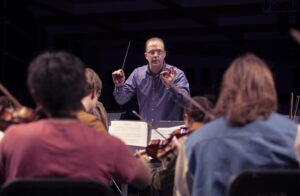
What Should I Major In?
While this question seems to be the most obvious place to start when considering a graduate school for the first time, it is important to note that occasionally what we decide to major in as graduate students has only a peripheral effect on our jobs. In other words, our graduate majors sometimes do more to enhance our niche than they do to train us on a specific skillset required of our profession. For example, the undergraduate training you received in your music education major enabled you to earn a specific credential that legally allows you to teach music in a public school. Any music degree beyond that will certainly add value to your craft and give you a richer perspective that can enhance how you approach teaching, but it will likely not fulfill a requirement for you to maintain your teaching position. Fortunately, there are several meaningful graduate majors for practicing music educators.
Music Education: Many music teachers who are first-time graduate students tend to major in music education because it aligns to what they know best. When you become a teacher, you quickly become immersed in the minutiae of facilitating instruction and leading a music program. The music education major is naturally constructed around that experience and provides training in specific skills related to many of the duties found within that role. However, it is important to note that a master’s degree in music education can be either academic-based or practitioner-based, so knowing what you want to achieve from this degree path is crucial before enrolling in a program that might not benefit you the way that you had expected.
While any master’s degree in music education will come with its fair share of introductory research courses, some programs intentionally structure their curricula with an abundance of research-based coursework in an attempt to produce independent scholarly researchers. Teachers who pursue this type of music education master’s degree are usually those who go on to pursue a terminal degree in music education and contribute to the growing body of research in music teaching and learning. In this type of program, you will likely encounter more research methods courses as well as courses in music education philosophy, history, psychology and sociology. Capstone requirements for an academic-based degree are usually the writing of a traditional master’s thesis and a successful defense of that manuscript in a student’s research area of interest.
On the other hand, some music education master’s degrees frame their plans of study in ways that are practitioner-based and meant to develop specific skills related to day-to-day classroom instruction. Coursework in these master’s degree programs may include arranging and orchestration, classroom management and student engagement strategies, or even courses in instrumental methods and repair. Capstone requirements for practitioner-based programs are generally flexible and could include projects such as a curriculum analysis or action research in one’s own building. Despite the inherent differences, both academic-based and practitioner-based music education master’s degree programs are extremely valuable to our profession and contribute something of merit to the field. Just be mindful to select a program that aligns to your interests and sets you on a trajectory to be molded into the academic and/or practitioner you want to become.
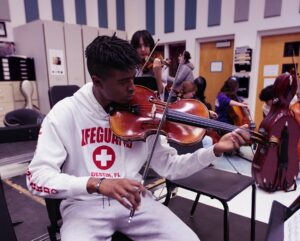
Other Majors in Music: While pursuing a master’s degree in music education has the most relevancy to what practicing music teachers encounter on a daily basis, some teachers prefer to pursue a graduate music major that strengthens a particular component of their teaching or aligns more to their musical interests outside the classroom. For example, music teachers who primarily serve as ensemble directors may find substantial benefit in a master’s degree in conducting because of how much time they spend actually conducting as part of their job. Or, perhaps a music teacher’s true passion is composing or performing and they are looking to gain more training to bolster their side hustle.
Regardless of the motive to pursue a graduate music degree outside of music education, consider this: when you major in something in graduate school, the expectation is that you are there to get better at that one thing. In other words, if you are pursuing a master’s degree in conducting, expect to graduate as a better conductor. If you are a performance major, expect to graduate with greater skill as a singer or instrumentalist. Your newfound insight will provide you with new ways to consume and curate musical experiences for yourself, but that expertise may not be immediately transferrable to your daily teaching. Fortunately, if you build upon your niche and incorporate it into your teaching practice, your students could receive an inimitable learning experience because of who you are and the unique skillset you bring to the classroom.
One other aspect to consider when deciding on your graduate music major is whether you would ever want to teach college. The minimum educational requirement for nearly all college teaching positions is a master’s degree. However, due in part to academic inflation and saturation in the music field, most college teaching jobs in music are given to candidates with terminal degrees and years of successful college teaching experience. If you are lucky, there could be a local university or community college who might look to you to fill an adjunct position, but the position for which you would be considered is most likely going to be based on your graduate major and less on your K-12 classroom teaching experience. In short, if full-time college teaching is something that interests you, plan on earning a terminal degree like a Ph.D., Ed.D. or D.M.A. after spending a few years in the classroom; if you are interested in the possibility of one day becoming an adjunct professor as a way to earn some supplemental income while you teach in the K-12 setting, know that whatever your master’s degree is in will likely be the only domain in which you would be qualified to teach.

Non-Musical Education Majors: Despite the numerous benefits of a master’s degree in the music field, there are plenty of practicing music educators who have pursued graduate degrees outside of music. While a master’s degree in a non-musical field like educational technology, school leadership, or curriculum and instruction does nothing to develop musical knowledge, it would diversify your resume, which could make you more indispensable to your school and community. Similar to how majoring in a musical field outside of music education provides teachers with a way to carve out a musical niche in their practice, pursuing a graduate major in education outside of music altogether can carve out an educational niche, potentially with greater collateral for success.
Consider this: when we engage in discourse with our musical colleagues about concerns like music education advocacy, student retention or funding, it reinforces a sense of community and contextualizes how we face uphill battles. As therapeutic as some of these gripe sessions can be, these conversations can sometimes lead to deafening echo chambers where we assume we understand what our school and community expects of us without seeing our responsibilities through different stakeholders’ lenses. Pursuing an area of education as a graduate major outside of music could help inform us how other education professionals view music education. Studying educational leadership, for example, could help make us privy to the ways we can best position ourselves alongside – and not against – policymakers to better advocate for our music students.
Music teachers who hold a master’s degree in a specialized area of education could also use this credential to serve their school in broader capacities than could sole music specialists. Many schools, especially those most affected by our current teacher shortage, are often looking for teacher leaders, instructional coaches or department chairs. Music teachers who have training in these domains from their graduate work in education could draw upon these skills to be greater assets to their schools and help further advance their careers.

One Final Thought
My intent with this article was to demystify some of the overarching concerns prospective master’s students have as they consider balancing graduate school and teaching music. And while the pursuit of a master’s degree is not the only way to improve one’s practice, embarking on a journey through graduate school demonstrates a special type of dedication and commitment to one’s craft that has the ability to transform the way you could approach teaching for the rest of your career.
When I was playing “Pomp and Circumstance” as an undergrad, little did I know that I would one day walk across the stage to receive my second doctorate. Being surrounded by content specialists, artist educators and hungry graduate students – figuratively and literally – helped me carve out my niche in my profession better than any other type of professional development and empowered me to become the best version of myself for my students and community. If you, like me, have ever thought that graduate school is something reserved for an exclusive club, please consider this your formal invitation to join us. I am sure you will master it!










